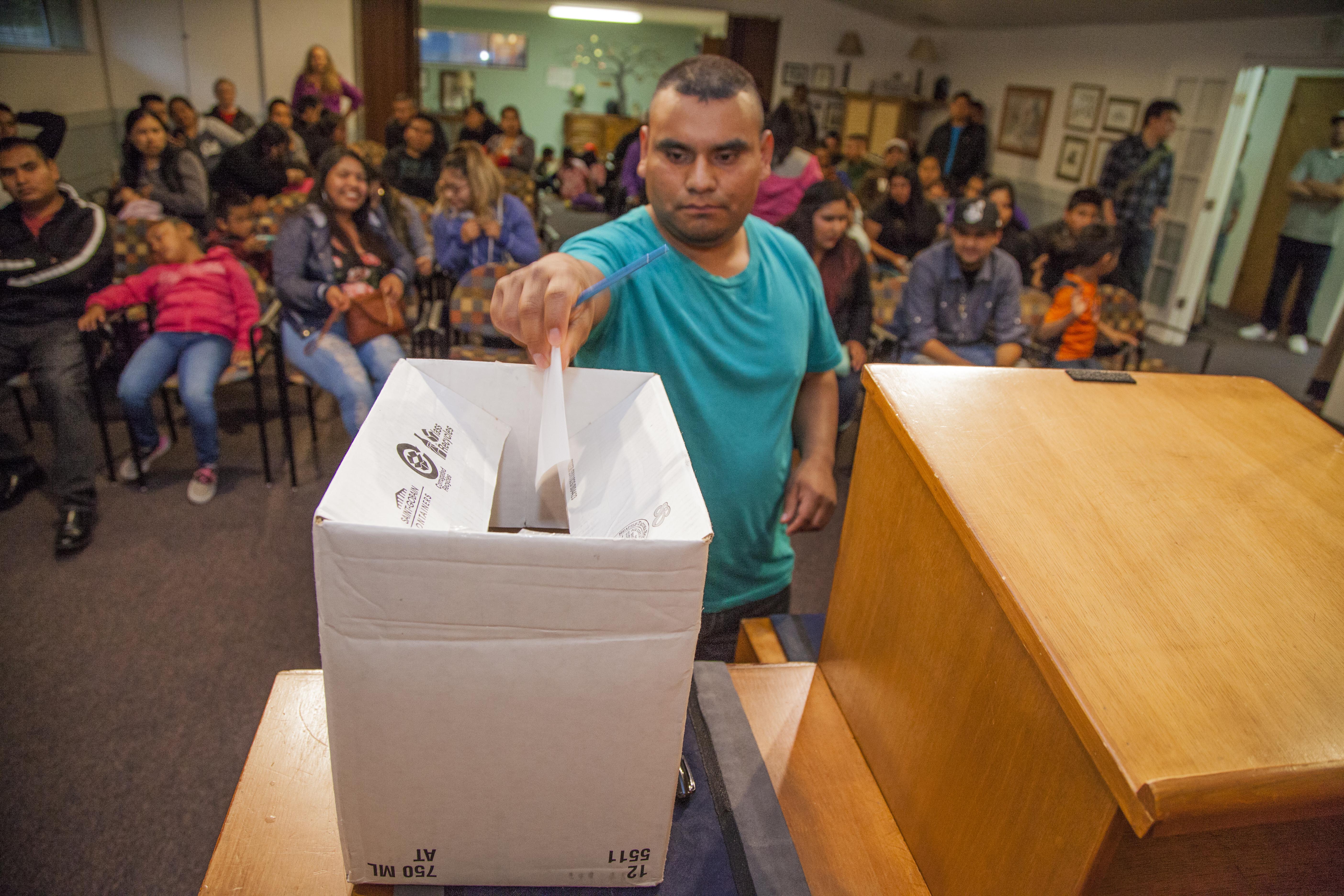Indigenous Oaxacan farm workers win themselves a union in the Pacific Northwest
by David Bacon
Bob’s Burgers and Brew, a hamburger joint at the Cook Road freeway exit on Interstate 5, about two hours north of Seattle, doesn’t look like a place where Pacific Northwest farm workers can change their lives, much less make some history. But on June 16, a half-dozen men in work clothes pulled tables together in Bob’s outdoor seating area. Danny Weeden, general manager of Sakuma Brothers Farms, then joined them.
After exchanging polite greetings, Weeden opened four folders and handed around copies of a labor contract that had taken 16 sessions of negotiations to hammer out. As the signature pages were passed down the tables, each person signed. Weeden collected his copy and drove off; the workers remained long enough to cheer and take pictures with their fists in the air. Then they too left.
It was a quiet end to four years of strikes and boycotts, in which these workers had organized the first new farm-worker union in the United States in a quarter-century-Familias Unidas por la Justicia (FUJ).
The union itself will not be like most others. At the ratification meeting held the previous night, many of the people packed into the hall of Mt.
Vernon’s Unitarian Church spoke with each other in Mixteco or Triqui. Members of Familias Unidas por la Justicia come originally from towns in Oaxaca and southern Mexico where people speak indigenous languages that were centuries old when the Spanish colonized the Americas.
“We are part of a movement of indigenous people,” says Felimon Pineda, FUJ vice president. An immigrant from Jicaral Cocoyan de las Flores in Oaxaca, he says organizing the union is part of a fight against the discrimination indigenous people face in both Mexico and the United States: “Sometimes people see us as being very low. They think we have no rights. They’re wrong. The right to be human is the same.”
According to Rosalinda Guillen, director of Community2Community, an advocacy organization that helped the workers organize, “Indigenous culture plays a huge role, especially people’s collective decision-making process. The strong bonds of culture and language give the union a lot of its strength.”
Sakuma Brothers Farms hires about 450 workers every year to pick its strawberries and blueberries from June through October, in its fields in Burlington and Mt. Vernon, Washington. About half live in the local area, and half come north for the picking season from Santa Maria, Madera, Livingston, and other farm-worker towns in California. The migrants from the south live in the company’s labor camps for the duration of the work.
Almost all Sakuma workers arrived from Mexico years ago, and have been living in the United States ever since.
Almost all Sakuma workers arrived from Mexico years ago, and have been living in the United States ever since. They depend on this seasonal job picking berries for a large part of their yearly income.
In 2013, workers grew angry about a low piece rate and bad conditions in the labor camps, and protested to company managers. One was fired and told to leave the camp where his family was living. The rest of the company’s workers then stopped the harvest to get his job and housing back. In the weeks that followed they began negotiating with the farm’s owners, the Sakuma family. They elected a committee to speak for them, which became the nucleus of Familias Unidas por la Justicia.
In the course of negotiations, the workers discovered that the company had recruited 78 laborers in Mexico, and brought them to the United States under the H2A visa program. These contracted workers could only work for the employer that recruits them, and could only stay for the duration of a work contract limited to several months, after which they had to return to Mexico.
“In 2013, the wages for the H2A workers were $12 an hour, and our wages were $9.37,” says Ramon Torres, one of the original strikers. “When we found that out, our first demand was that we get the same pay.”
Under the H2A program rules, employers have to show they can’t find workers in the United States before they can recruit contract workers abroad. After the 2013 picking season ended, Sakuma Farms sent letters to the workers involved in the work stoppages, saying they’d been terminated for missing work. The farm then applied to the Department of Labor for visas to bring in 479 workers-enough to replace its entire workforce.
Torres calls this a watershed moment for the workers, whose response to Sakuma’s visa request was brilliantly effective. “We wrote letters, to prove to the government that we were ready to work. When people heard that the company was saying that they couldn’t find any workers, everyone signed the letter. Everyone. We filled out 489 letters.”
After union members and supporters handed in the letters at Department of Labor offices in San Francisco, Seattle, Washington, D.C., and Chicago, the company withdrew its application. With no H2A workers to pick the berries, it was forced to rehire the strikers for the 2014 season. “That made our members even stronger in their support for the union,” Torres says. “Everyone understood then that the company wanted to replace us, and that we needed a union to protect ourselves. That made our struggle easier.”
This article was cut to fit space. To view the entire article, please visit:
http://davidbaconrealitycheck.blogspot.com/2017/06/a-new-farm-worker-union-is-born.html



